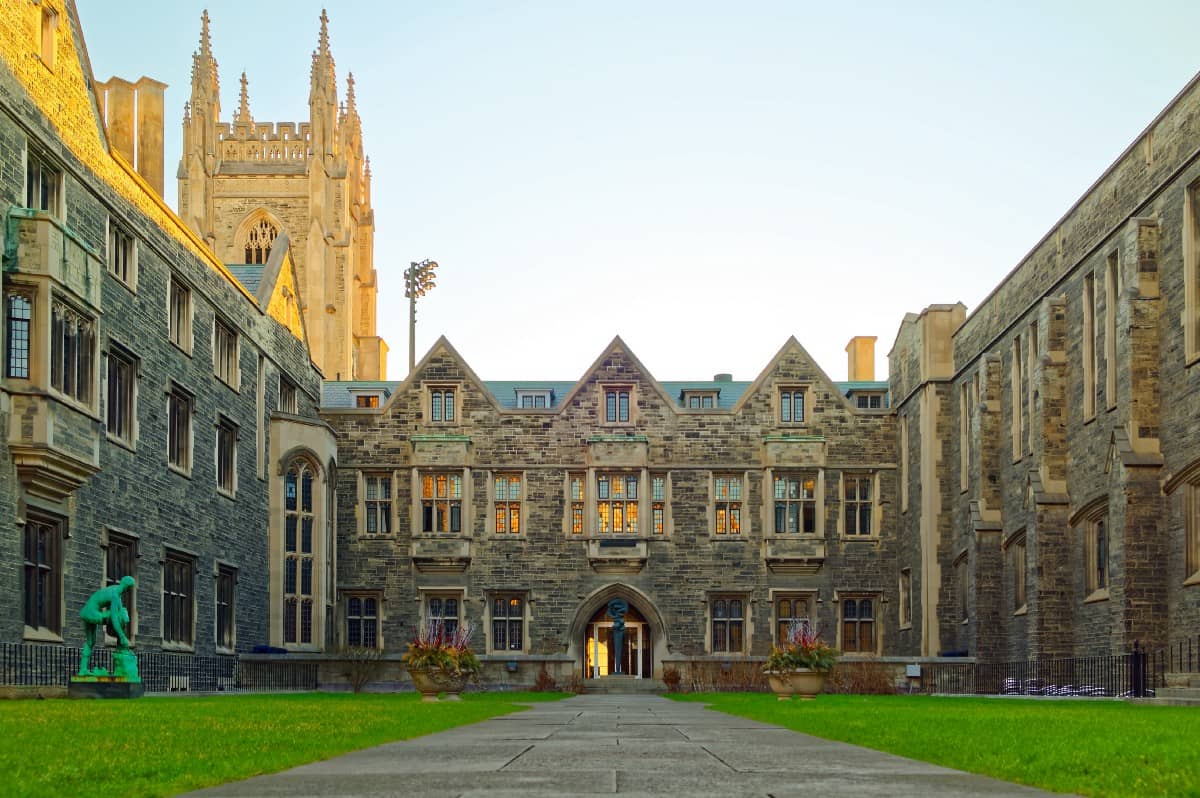While there are plenty of tech positions that do not need a degree, having one will definitely benefit, especially from a reputable institution such as Stanford or MIT.
These are not the only stalwarts in the field of technology that you can remember. Several other options could be almost as useful to your ability set and potential career, with better admission rates and lower tuition costs.
We conducted a coast-to-coast survey to identify the best tech colleges in the United States. These outstanding technology schools are mentioned alphabetically below in our ranking of the best tech colleges.

1. Carnegie Mellon University
located in Pittsburgh, Pennsylvania.
Niche.com rates CMU as the No. 1 college in the United States for information technology. It is particularly well-known for its graduate school programs. Additionally, US News & World Report rates CMU as having the best graduate school in computer science and the best graduate program in information technology management.
B.S. degrees in artificial intelligence, computational engineering, computer science, human-computer interaction, information processing, machine learning, and robotics are available at CMU. Specializations available upon completion of a bachelor’s degree include animation/special effects, business/enterprise processes, game design, and quantitative research. Computer science, information technology, and digital engineering are also available as M.S. degrees at CMU. Finally, if you’re interested in pursuing a Ph.D. in computer science, CMU provides one.
The ratio of acceptance: 15.4 percent (2020)
Annual fees for undergraduates: $57,560
Enrollment total: 14,799 (fall 2019)
60.9 percent of graduates are working, while 27.2 percent continue their studies (2019)
2. University of Cornell
A brief overview: Cornell Computing and Information Science (Cornell CIS) is the umbrella organization for three divisions that are inextricably linked: computer science, information science, and statistical and data science. The unit, which is housed in Gates Hall on the university’s Ithaca, New York campus, is currently researching various subjects, ranging from fundamental technologies such as natural language processing and computer science to more contemporary concerns such as human-robot interaction and technology and equity.
Cornell provides three distinct bachelor’s degrees in information technology; each taught at a different campus. Applicants can select from the College of Arts and Sciences’ B.A. in information science, the College of Agriculture and Life Sciences B.S. in information science, or the College of Engineering’s B.S. in information systems and technology. Cornell University also provides a Master’s degree in computer technology and a Ph.D. in information science.
10.9 percent acceptance rate (2020)
Annual tuition: $39,244 for in-state students (state contract colleges) $58,586 out-of-state (state contract colleges) Colleges endowed with funds: $58,586
Enrollment total: 23,620 (fall 2020)
66 percent of students are placed in employment.
3. Illinois Institute of Technology The Illinois Institute of Technology
Illinois Tech is a corporate, not-for-profit, technology-focused research institution with a strong emphasis on information engineering and computer science. This, along with a detailed understanding of computer science philosophy, establishes firm foundations for long-term job performance. Illinois Tech is a leader in innovation in artificial intelligence, information networking, cryptography, data science, parallel and distributed networks, information engineering, and computational philosophy.
Bachelor’s, master’s, and doctoral degrees are available in various career-focused specializations, including network security, forensics, data management, digital systems technology, and embedded systems.
Acceptance rate: 62.2% (2020)
Tuition a year: $47,670 (fall 2020)
Enrollment total: 6,342 (fall 2020)
69.2 percent of graduates are working, while 14.6 percent continue their studies (2020)
4. Bethlehem, Pennsylvania: Lehigh University
Overview: Lehigh’s technology majors have a solid base of computer science and engineering, beginning with the hardware/software interaction and progressing across systems software, programming languages, software engineering, and the statistical foundations of computation. Artificial intelligence, computer networking, parallel and distributed processing, surveillance, robotics, bioinformatics, data mining, web, and mobile application creation, and databases are all available as electives.
Lehigh University provides a range of computer science and information technology degree programs, including B.A. and B.S. degrees in computer science, as well as a dual B.S. degree in computer science and business. The above is certified in computer science and business and prepares students to handle and innovate in the information technology environment in a corporate context.
Acceptance score of 25% (2020)
Tuition a year: $54,790 (fall 2020)
Enrollment total: 7,067 (fall 2020)
70% of graduates are working, while 23% further their studies.
5. Massachusetts Institute of Technology
A brief overview: MIT is a world-renowned institution that regularly ranks first in the US News & World Report and other college rankings. Additionally, it is well-known for its world-class faculty and science. MIT’s research increases the quality of life for citizens worldwide, from machines that operate alongside skilled dance troupes to medicinal electronic instruments that harness energy from variations in body temperature.
Undergraduates can choose from the following programs: electrical science and engineering; electrical engineering and computer science; computer science and molecular biology; or computer science, economics, and data science. Additionally, MIT gives masters and doctoral degrees.
6.7 percent acceptance rate (2020)
Tuition a year: $53,790 (2019)
Enrollment total: 11,254 (2020-21)
53% of graduates are working, while 41% continue their studies.
6. University of Michigan-Troy
A brief overview: Michigan Tech is a medium-sized public university that provides undergraduate and graduate programs in computer science, information engineering, and cybersecurity. Software engineering, human-machine interaction, simulated environments, data analytics, and simulation are among the areas of specialization in the Department of Computer Science. Additionally, it has significant capabilities in operating systems, systems applications, and concurrent computation. Students involved in games should understand Michigan Tech’s game production focus.
Michigan Tech provides bachelor’s degrees in information technology, cryptography, and digital engineering, as well as master’s degrees in computer science or cybersecurity and a doctoral program in computational science and engineering.
74.3 percent acceptance rate (2020)
Annual tuition: $16,130 for in-state students; $36,432 for out-of-state students (fall 2020)
Enrollment total: 7,041 (2020)
93 percent of students are placed in employment (2020)
7. Institute in Technology of New Jersey
A brief overview: NJIT, which is located 20 minutes by train from Manhattan, bills itself as one of the country’s most computing-intensive campuses. The university’s multidisciplinary program and emphasis on computing-intensive research prepare students for tech proficiency, market acumen, and leadership. NJIT graduates often find positions with Fortune 500 firms such as IBM, Mercedes-Benz, and Pfizer, the manufacturer of the COVID-19 vaccine.
NJIT provides bachelor’s degrees in bioinformatics, business and information systems, computer science, computing and business, human-machine interaction, information systems, and information technology, as well as network and information systems.
Acceptance rate: 73.8% (2020)
Annual tuition: $17,674 for in-state students; $33,386 for out-of-state students (2019-20)
Enrollment total: >11,400 (2020)
82 percent of students are placed in employment (2019)
8. Institute of Rensselaer Polytechnic
Overview: Established in 1824, it bills itself as the world’s oldest tech university. Rensselaer Polytechnic Institute maintains a startup incubator on campus as well as a 1,250-acre technology park. Its Department of Computer Science is rapidly expanding, especially in the areas of artificial intelligence, machine learning, and cybersecurity. Its graduates have differentiated themselves by establishing businesses while still in school and securing high-paying positions at a diverse variety of businesses.
B.S., M.S., and Ph.D. degrees in computer science are available.
The ratio of acceptance: 47.4 percent (2020)
Tuition a year: $55,600 (2020-21)
Enrollment total: 7,569 (2020-21)
84 percent of students are placed in employment (2017)
9. Institute of Technology in Rochester
The computer science curriculum provides students with a strong background in philosophy and contemporary software and hardware topics, as well as an introduction to a variety of programming languages and paradigms. Additionally, students are compensated for working full-time in technological corporate environments.
RIT provides a diverse variety of tech degrees, beginning with an associate’s degree.
Final Thoughts
Once admitted into these colleges for your tech degree, you still need to write essays, but don’t worry, you can pay someone to do your essay. That way, you can spend more time concentrating on what you about the most, which is tech and coding.








